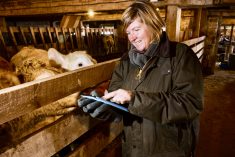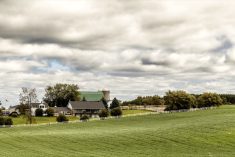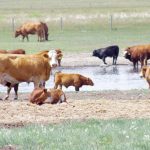Even top-performing farmers need advice. In fact, when farmers fine-tune their operations to maximize yield and profitability, they can plan on needing more financial advice than ever before.
This is for some very good reasons. Not only do risks grow with the scale and complexity of the operation, but so do the opportunities, and today’s farmers want to be poised to seize them.
In this business environment, Christopher Costain has a pitch to make. Costain is director of agriculture for BMO Commercial Bank, and says there’s a bigger role banks can play to help farms thrive through the highs and lows.
Read Also

Lessons from the past: How Canada can reverse its shrinking share of the global food market
A historic look back at how Canada has positively dealt with trade issues — and how those lessons can inform future moves.

“Banks don’t just do lending,” says Costain. “Our services are vast. We have a lot more to offer. If we’re only selling the loan, we’re selling you short.”
And farmers are ready, he says. “In a lot of cases, farmers want to be challenged and have robust discussions about their strategies, whether it’s interest rate strategy or investment decisions.
“Farmers don’t want a lender that just nods and sets up the loan — they want one that is thoughtful, and willing to challenge them and be challenged.”
What will you hear? Below are tips for today’s high-performance farms from a few of Canada’s top bankers.
Build resiliency
BMO’s Costain says successful farmers understand their risk exposure at all levels, from production risk to market and interest rate risk.
They also take risk off the table by locking in income through contracts and by fixing expenses like interest rates, and they excel at articulating their risk management strategies to capital partners.
For farmers like these, the next focus is to build resilience, “so whatever the strategy, they have a little extra in their balance sheet that they can leverage, or they have working capital that’s available if they have challenges,” says Costain.
Such farmers, he says, ensure they have working capital options, whether that’s land that can be borrowed against or assets that are not critical to their operation that can be liquidated if an opportunity or challenge comes up.
Dave Klingenberg, senior relationship manager for Farm Credit Canada, agrees that adequate working capital and operating funds are critical in light of inflation and increasing interest rates.
“Risks exist for a farmer of any size; they are amplified when the size of the operation grows,” says Klingenberg.
That makes it wise to stay on top of renewals and potential increases in debt service obligations with rising rates. And it also makes it smart to learn about new tools.
“More farming operations are being encouraged to participate in transactions that involve derivatives,” Klingenberg says. “It’s important that producers understand the transactions they are getting involved in to use these tools appropriately to their benefit with a managed risk.”
Costain says if producers are facing high interest rates, they need levers they can pull to meet their requirements. This can be a touchy subject for some, he says, but it’s important that farmers have a strategy in terms of unencumbered assets.
“There’s a tendency in the industry to go short in terms of interest rates,” he says. But products exist to hedge both interest and foreign exchange risk.
When it comes to sustained growth, Trevor Sproule, head of agricultural banking for Canadian Western Bank, says it may also be smart to consider bank syndications.
“Most financial institutions have single-client hold limits, so by leveraging a multi-bank syndication, additional capital can be accessed,” Sproule says. “Another avenue for continued growth is the use of joint ventures that allow multiple farm operations (could be both family or even close neighbours) to leverage resources and knowledge from multiple operations.”
This could include shared equipment, an enhanced land base for different crop rotations, and dual management coverage in some areas in case of death or illness.
Focus on human resources
Klingenberg says when top-performing farmers talk to their bankers today, a growing topic is finding and maintaining the right people for operational success.
It’s critical not to neglect human resources, he says. But it’s just as crucial to encourage development and celebrate employees’ success.
“It takes good people working together to keep these operations successful,” says Klingenberg. “It’s also important to ensure your people know they are supported in protecting their mental health to help prevent burnout.”
Similar advice then applies to succession planning. When today’s farms get down to building their farm transition strategies, it’s important to plan for worst-case scenarios like disability or death not only of the ownership group, but also key employees.
As important as it is to create a strategic plan, Klingenberg adds that the plan should be agile enough to account for necessary change — or unexpected developments.
Such a plan means the top-performing farm can gain more from their bankers and financial advisors, who will have a better understanding of the intended direction of the operation and can work better with the farm team to see the big picture and buy into the process of getting there.
Another piece of advice?
Hire or appoint a chief financial officer, says Sproule. “Have a full-time or fraction CFO in place to manage the cash flow of the business and ensure they remain within covenants,” he suggests. “The CFO should be proactive in identifying operational challenges or cash-flow issues that have the potential to arise in the future and address them in a timely manner.”
Rely on your advisors, but challenge them too
In today’s agriculture, it goes without saying that high-performing farmers already have good relationships with their farm advisors.
Leading farmers should understand how to get the most from these relationships, says Scott Preston, director and team leader of commercial banking for CIBC. “My best advice would be to regularly update your advisors,” he says. “It’s also easier for your plans to pivot, if needed, when everyone is aligned. The stronger your relationships are with your advisors, the easier it is for you to execute on your strategic plan.”
Sproule agrees: “From our side, as advisors, we are always looking to see what a farm’s year-to-date results are looking like compared to projections,” he says. “This allows us to have a conversation with these high-performing farmers on potential issues or even opportunities that have not been addressed or planned for during the annual review process or last credit submission. It is our job to be proactive in this and ensure challenges are dealt with.”
Sproule also agrees that the farmer’s openness to advice should go beyond accounting, banking and legal experts. “Make use of advisors in all parts of the operations,” he says. “This means having a sounding board for everything from crop rotation to fertilizer/chemical use to capital purchases to debt structure. That’s the value of working with advisors that work with a relationship approach — they have their own network of experts they can call on for support when needed.”
It’s important to remember that every farming operation is unique, Preston adds. The gap between smaller farms and large operations can be significant, but these days, some large operations are run like smaller-scale farms, while some smaller-scale clients have highly sophisticated business structures.
Regardless of size, the thing successful operations have in common is that they view their advisors as key contributors of advice and guidance. “They have open dialogue, ask questions and share their short- and long-term ambitions,” says Preston.
Costain says BMO’s Canadian farm clients excel at dealing with their challenges unique to their landscape. “Our producers take advantage of risk management programs that are offered, as well as market opportunities,” he says.
They can also be incredibly community-minded.
“It sometimes blows me away how many producer organizations our farmers participate in, how many they support, (and) how freely they offer their support. I think they do an exceptional job of that. They help neighbours. That comes back in spades.
“They take that rural mentality to the boardroom with them and it’s part of their key metric to success.”
– This article was originally published in the October 2023 issue of Country Guide.
















